What is Porcelain Tile?
Porcelain tile, and Ceramic Tiles, is a high-performance ceramic material made from refined clay and other natural materials. It’s fired at very high temperatures, which gives it its dense structure, making it incredibly durable and resistant to moisture. Because of its unique composition and manufacturing process, porcelain tile is one of the most popular choices for both residential and commercial flooring and wall covering.
The main feature of porcelain tile is its incredible durability, but it is also prized for its wide variety of designs, finishes, and versatility. Whether you want a sleek, glossy floor in your kitchen or a rustic, matte finish for your bathroom, porcelain tile can give you all of that and more. It can be used in nearly every room in the house and even outdoors!
Why Choose Porcelain Tile?
Porcelain tiles ,and Dal Tile, are well-known for their durability. Whether you’re looking for a solution for your kitchen, bathroom, or outdoor space, porcelain tiles can stand up to heavy foot traffic, stains, and moisture. Here’s why you should consider porcelain tiles:
- Durable Tile Options: Porcelain tiles are dense and tough, making them perfect for high-traffic areas.
- Water-Resistant Flooring: Because of their low water absorption rate, porcelain tiles are ideal for wet areas like bathrooms and kitchens.
- High-Performance Tiles: With their excellent strength and resistance to scratches, they’re perfect for spaces that see a lot of use.

Types of Porcelain Tiles
Porcelain tiles come in a variety of styles, finishes, and textures. Understanding the different types can help you choose the best option for your home or project.
Porcelain Slabs:
Porcelain slabs are larger, more contemporary pieces of porcelain tile that can be used to create seamless, modern looks. These tiles can be installed with minimal grout lines, making them ideal for sleek, minimalist designs.
Matte Finish Tiles:
Matte porcelain tiles are perfect for creating a sophisticated, understated look. Their non-reflective surface provides a natural, earthy feel, and they’re less likely to show dirt and footprints.
Glossy Porcelain:
For those who love a shiny, polished look, glossy porcelain tiles offer a smooth, reflective surface. These tiles are perfect for creating bright, airy spaces like bathrooms and living rooms.
The Benefits of Porcelain Flooring Choices
When it comes to selecting flooring for your home, porcelain tiles stand out as one of the most durable, stylish, and versatile options available. Whether you’re renovating your kitchen, updating your bathroom, or designing a sleek living room, porcelain tiles offer a range of benefits that make them an excellent choice for any space. This chapter will explore the numerous advantages of porcelain flooring, from its incredible durability to its ease of maintenance and aesthetic appeal.
Porcelain flooring is often hailed as a superior choice due to its many benefits, and understanding these advantages will help you make an informed decision for your home.
1. Exceptional Durability
One of the standout qualities of porcelain tiles is their exceptional durability. Porcelain is a type of ceramic tile that is fired at higher temperatures, making it denser and more durable than standard ceramic tiles. This increased density makes porcelain tiles incredibly resistant to cracking, scratching, and chipping.
- Benefit: Porcelain flooring is perfect for high-traffic areas like kitchens, hallways, and bathrooms. It can withstand the wear and tear of daily life, including the impact of heavy furniture or dropped items.
Porcelain tiles are also known to be very strong under pressure. This makes them ideal for installation in areas that receive heavy foot traffic, ensuring they’ll last for years without significant damage.
2. Water-Resistant and Low Maintenance
Another major benefit of porcelain flooring is its water resistance. Unlike wood or carpet, porcelain tiles do not absorb moisture, making them an excellent choice for areas prone to spills and humidity, such as bathrooms, kitchens, and basements. The non-porous nature of porcelain ensures that water stays on the surface, making it easy to wipe away without worrying about seepage or stains.
- Benefit: Water resistance means porcelain flooring can handle moisture without warping, swelling, or developing mold or mildew. This makes it an ideal solution for bathrooms, laundry rooms, and kitchens.
The low-maintenance nature of porcelain tiles also means you won’t have to spend much time keeping them clean. Regular sweeping or vacuuming, along with occasional mopping, is all that’s needed to maintain their appearance. No need for extensive treatments or sealing, as porcelain tiles are naturally resistant to dirt and stains.
3. Versatile Design Options
Porcelain tiles offer an incredible variety of design options, making them versatile enough to complement nearly any style of interior design. Whether you prefer a rustic farmhouse look, a sleek modern design, or a more classic aesthetic, there’s a porcelain tile to match.
- Benefit: Porcelain tiles come in a variety of colors, textures, patterns, and sizes. You can choose from matte, glossy, polished, or textured finishes, and they can even mimic the appearance of other materials like wood, marble, or stone.
4. Temperature Control and Energy Efficiency
Porcelain tiles can help regulate indoor temperatures, making them a more energy-efficient flooring option. Due to their thermal mass, porcelain tiles naturally absorb and retain heat, helping to keep your home warmer in the winter. In the summer, they remain cool underfoot, providing a comfortable walking surface even on hot days.
- Benefit: In colder climates, pairing porcelain tiles with underfloor heating systems can help improve energy efficiency by keeping your home warm without the need for additional heating systems.
Choosing the Right Porcelain Tile for Your Space
When selecting porcelain tiles, it’s essential to consider the following factors:
- Size of the Space: Large tiles work best in bigger rooms, while smaller tiles can be better for smaller areas.
- Design Style: Think about the overall aesthetic you want to achieve. Whether you go for the sleek look of polished ceramic or the rustic appeal of matte finish tiles, porcelain tiles can suit any interior style.
- Texture and Finish: Some spaces may benefit from textured tiles, especially in wet areas like showers, while others may look best with smooth, glossy porcelain.
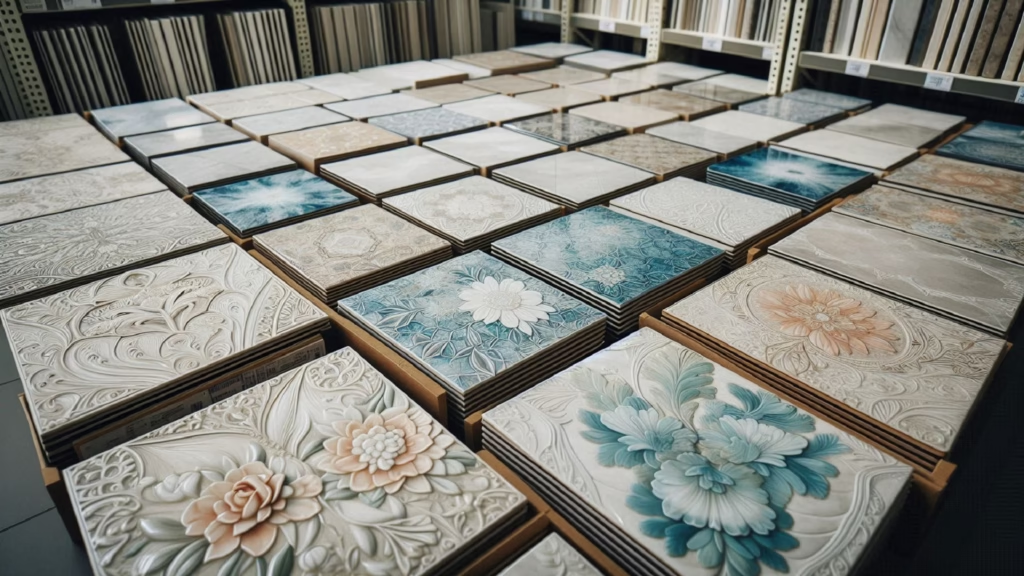
Polished Ceramic vs. Glossy Porcelain
While both polished ceramic and glossy porcelain tiles offer a shiny finish, there are some key differences between the two.
- Polished Ceramic: Ceramic tiles are generally softer than porcelain and may not be as durable for high-traffic areas. However, they can still provide a glossy, sleek look in the right spaces.
- Glossy Porcelain: Porcelain tiles, on the other hand, are fired at a higher temperature, which makes them harder, denser, and more durable. Glossy porcelain tiles are a great choice for a sophisticated, long-lasting floor finish.
Water-Resistant Flooring: A Must-Have for Bathrooms and Kitchens
One of the main reasons people choose porcelain tile for their homes is its ability to resist water. This makes it an excellent choice for:
- Bathrooms: Porcelain tiles provide a waterproof barrier, ensuring that moisture won’t seep into the subfloor and cause damage.
- Kitchens: Whether you’re cooking, cleaning, or entertaining, porcelain tiles hold up well to spills, splashes, and messes.
Heavy-Duty Tiles for High-Traffic Areas
Porcelain tiles are designed to stand up to a lot of wear and tear, making them perfect for heavy-duty areas like:
- Entryways: The high-performance durability of porcelain tiles means they can handle the constant foot traffic that comes with entryways.
- Living Rooms: For large family spaces, porcelain provides a durable surface that can last for years.
Porcelain Tile Designs to Inspire You
From modern, geometric patterns to rustic, earthy finishes, the design possibilities with porcelain tiles are endless. Whether you’re after a classic look or something more contemporary, porcelain tiles offer a broad range of styles.
- Wood-Look Porcelain Tiles: These tiles mimic the look of hardwood but offer the durability and water-resistance of porcelain.
- Stone-Look Tiles: With their realistic textures and colors, stone-look porcelain tiles create a luxurious feel without the upkeep of natural stone.
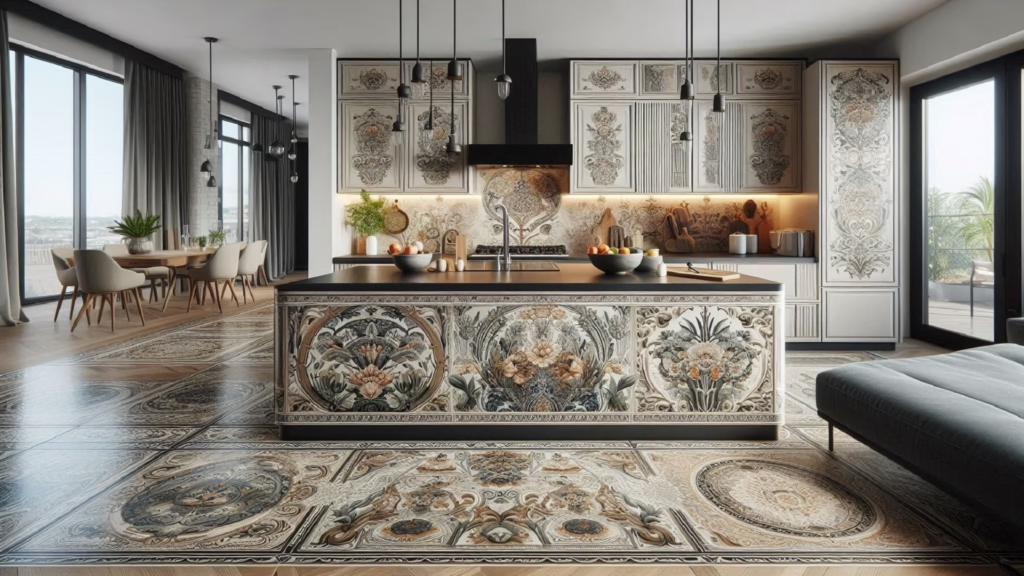
Porcelain Tiles vs. Other Flooring Materials
When it comes to flooring, there are many choices, but porcelain stands out in many categories. Let’s compare porcelain tiles with some other popular flooring materials to highlight their advantages:
Porcelain vs Ceramic Tiles
- Durability: While ceramic tiles are durable, porcelain tiles are denser and more robust. They are less likely to crack or chip under heavy use.
- Water Resistance: Porcelain tiles have a significantly lower water absorption rate than ceramic, making them the better choice for bathrooms and kitchens.
- Maintenance: Both ceramic and porcelain tiles are easy to maintain, but porcelain requires fewer touch-ups over time due to its resistance to stains and scratches.
Porcelain vs Hardwood Floors
- Cost: Porcelain tiles can be more affordable than high-quality hardwood flooring, especially when considering long-term maintenance.
- Water Resistance: Hardwood is not suitable for wet environments, as it can warp and stain. Porcelain, however, holds up well in moisture-prone areas like bathrooms and kitchens.
- Durability: Porcelain tiles are more durable and easier to clean than hardwood, which can get scratched or damaged over time.
Porcelain-Vinyl Flooring
- Durability: Porcelain is much more durable than vinyl, especially in areas with heavy foot traffic. Vinyl can tear and fade, while porcelain tiles maintain their appearance for years.
- Water Resistance: Porcelain tiles are inherently water-resistant, while vinyl flooring may start to buckle or peel in wet areas.
- Aesthetic Appeal: Porcelain offers a more luxurious look than vinyl and is available in a wider variety of designs.
The Cost of Installing Porcelain Tile
While porcelain tiles may have a higher upfront cost than some other flooring options, the long-term benefits and durability make it a wise investment. Here’s a breakdown of the costs involved:
- Material Costs: Porcelain tiles typically cost more per square foot than ceramic or vinyl tiles. However, prices can vary based on style, size, and brand.
- Installation Costs: The installation process for porcelain tiles requires more expertise than some other materials, so professional installation is recommended. Labor costs will depend on your location and the complexity of the project.
- Maintenance Costs: One of the benefits of porcelain tiles is their low maintenance cost. Unlike hardwood floors that require refinishing or vinyl that needs replacing, porcelain tiles will maintain their quality with simple cleaning.
How to Install Porcelain Tiles Like a Pro
While installing porcelain tiles is best left to professionals, understanding the process can help you make informed decisions. Here’s an overview of the steps involved in porcelain tile installation:
- Preparation: Clear the area and make sure the floor is clean, dry, and level.
- Layout: Plan the tile layout to avoid awkward cuts or small pieces at the edges. A chalk line can help you achieve a straight line.
- Cutting Tiles: Use a tile cutter or wet saw to cut tiles to fit the edges of the space.
- Laying Tiles: Apply thin-set adhesive to the floor and place tiles in position. Leave space for grout between tiles.
- Grouting: Once the adhesive has set, apply grout between the tiles and clean the surface with a damp sponge.
- Sealing: Some types of porcelain tiles may need to be sealed to prevent staining, although many modern porcelain tiles are pre-sealed.
Caring for Your Porcelain Tiles
One of the greatest benefits of porcelain tiles is their easy maintenance. Here are some tips for keeping your porcelain floors looking like new:
- Regular Cleaning: Sweep or vacuum your floors regularly to remove dirt and debris. For more thorough cleaning, use a damp mop with a mild detergent.
- Avoid Harsh Chemicals: While porcelain is durable, avoid using harsh chemicals or abrasive cleaning tools that could damage the surface.
- Seal Grout: If your porcelain tiles have grout, ensure that it’s sealed to prevent moisture and stains from seeping in.
- Handle with Care: Although porcelain is tough, it can still be damaged by heavy impacts. Be cautious with heavy furniture or appliances.

Porcelain Tile Designs to Fit Any Home
Porcelain tiles come in an array of colors, textures, and designs that can fit any home decor style. Here are a few ideas for incorporating porcelain tiles into your home:
Modern and Minimalistic
For a sleek and contemporary look, opt for large, glossy porcelain tiles in neutral tones like white, gray, or beige. These tiles work well in open-concept spaces and create a clean, polished aesthetic.
Rustic and Natural
Wood-look porcelain tiles offer the charm of hardwood with the durability of porcelain. These tiles can give your space a warm, rustic feel, whether used in a living room, kitchen, or bathroom.
Luxury and Elegance
Stone-look porcelain tiles mimic the beauty of natural stone, such as marble or granite, but without the maintenance. These tiles create a luxurious feel in spaces like bathrooms, entryways, or dining rooms.
Eco-Friendly Porcelain Tiles
Sustainability is an essential consideration for many homeowners, and porcelain tiles are an eco-friendly choice. Here’s why:
- Natural Materials: Porcelain tiles are made from natural clay and other raw materials, making them a more sustainable option compared to synthetic flooring materials.
- Energy-Efficient Production: The manufacturing process of porcelain tiles has become more energy-efficient, reducing its carbon footprint.
- Recyclability: When it’s time to replace your porcelain tiles, they can be recycled into new products, making them a sustainable option for your home.
The Future of Porcelain Tile
As technology advances, so does the world of porcelain tiles. Here are some innovations to watch for:
- Smart Tiles: Some manufacturers are exploring the integration of technology into porcelain tiles, such as self-cleaning tiles or tiles with embedded sensors that can monitor temperature or humidity.
- Sustainable Materials: The trend toward sustainability continues, with eco-friendly porcelain tiles made from recycled materials or produced with fewer resources.
- Customization: Advances in digital printing technology allow for more personalized and intricate tile designs, so you can create a truly unique space.
Advanced Design Options with Porcelain Tile
Porcelain tiles have evolved far beyond just basic square shapes and simple colors. Thanks to technological advancements, there are now endless design possibilities to elevate your interior spaces. Let’s dive deeper into some of the advanced design options that you can consider when using porcelain tiles.
Large Format Tiles
Large format tiles are a popular trend in modern interiors. These tiles, typically larger than 12×12 inches, create a sleek and seamless look. They are perfect for spaces where you want to create the illusion of more space, as the fewer grout lines make the room feel more open and clean. Large porcelain tiles work well in open-plan areas, living rooms, or even expansive bathrooms.
- Benefits: Fewer grout lines for easier cleaning, modern and sophisticated aesthetic, ideal for spacious areas.
Porcelain Tiles with Patterned Prints
In addition to classic monochrome tiles, porcelain tiles with intricate patterns or even 3D textures are gaining traction. These can be used to create feature walls or focal points in a room. Patterns like herringbone, chevron, geometric designs, and mosaics bring personality and style to the space.
- Benefits: Adds character, serves as a conversation piece, can make a small area stand out with artistic flair.
Textured Porcelain Tiles
Not all porcelain tiles have to be glossy or matte. Some tiles come with textures that mimic natural materials like wood, stone, or even fabric. Textured porcelain tiles create a more tactile surface that can make a space feel more grounded and natural.
- Benefits: Adds depth and character, great for accent walls, bathrooms, and outdoor spaces, provides a unique look and feel.
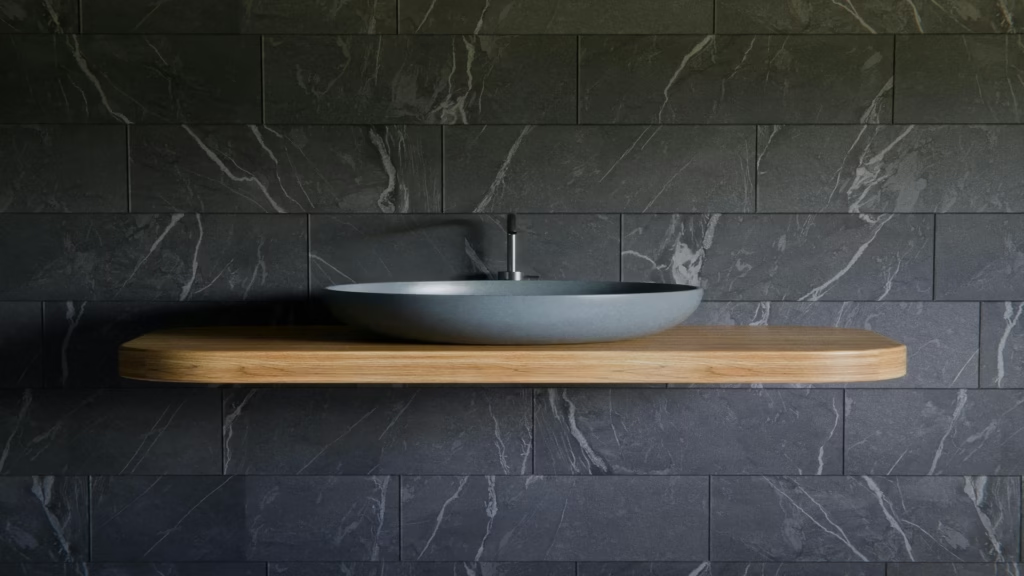
Porcelain Tiles in Different Rooms of the House
Each room in your home serves a different purpose, and the tiles you choose can play a big part in enhancing functionality and aesthetics. Here’s a breakdown of how porcelain tiles can fit into each room of the house:
Kitchen
The kitchen is one of the most high-traffic areas in a home, making durability and easy maintenance important. Porcelain tiles, especially those with a matte finish, are perfect for kitchen floors because they are slip-resistant, durable, and resistant to stains from cooking oils or spills.
- Benefits: Easy to clean, withstands heavy foot traffic, and can complement both traditional and contemporary kitchen styles.
- Popular Choices: Wood-look porcelain for a rustic feel, glossy porcelain for a sleek modern design, and patterned porcelain tiles for statement backsplashes.
Bathroom
Porcelain tiles are especially popular in bathrooms due to their water resistance. You can use porcelain for both the floors and walls, including the shower area, to create a sleek and cohesive look. Their ability to withstand moisture makes them ideal for wet areas.
- Benefits: Water-resistant, mold-resistant, non-slip options available, and they create a seamless, clean aesthetic.
- Popular Choices: Subway tiles for classic looks, large porcelain slabs for modern bathrooms, and stone-look porcelain tiles for an elegant feel.
[Image Placeholder: “Porcelain tiles in a bathroom” – Alt tag: “Modern bathroom with porcelain tiles covering the floor and walls for a cohesive design.”]
Living Room and Hallways
Porcelain tiles in the living room or hallway can bring a sense of warmth and sophistication. For areas where heavy foot traffic is common, porcelain provides the durability to stand up to constant use while maintaining its visual appeal.
- Benefits: Large format tiles create a sleek, open feel. Easy to clean, they are ideal for high-traffic areas like hallways and living rooms.
- Popular Choices: Large, glossy porcelain tiles in neutral tones, or textured porcelain tiles for a cozy, natural look.
Outdoor Spaces
Porcelain tiles aren’t just for indoors—they can transform outdoor spaces as well. From patios to outdoor kitchens, porcelain tiles provide a low-maintenance, durable solution for exterior areas exposed to the elements.
- Benefits: Resistant to UV rays, water, and temperature fluctuations. Available in non-slip finishes for safety.
- Popular Choices: Outdoor porcelain tiles with wood or stone effects for a natural look, and textured finishes to enhance grip.
Pros and Cons of Porcelain Tiles
Like any product, porcelain tiles have their pros and cons. It’s essential to weigh both to decide whether porcelain is the right choice for your home.
Pros:
- Durability: Porcelain is incredibly strong and resistant to wear, making it ideal for high-traffic areas like kitchens and hallways.
- Low Maintenance: Porcelain tiles are easy to clean and don’t require extensive care, unlike natural stone or hardwood.
- Water Resistance: Their low absorption rate makes them ideal for wet spaces, including bathrooms and laundry rooms.
- Aesthetic Flexibility: Porcelain tiles are available in a variety of styles, textures, and colors to match any interior design style.
- Eco-Friendly: Made from natural materials and capable of being recycled, porcelain tiles are a more sustainable choice compared to some other materials.
Cons:
- Price: Porcelain tiles are often more expensive than other flooring options, such as ceramic or vinyl tiles.
- Hardness: Porcelain tiles are hard, which means they can be uncomfortable to stand on for long periods and may cause dishes or glasses to break if dropped.
- Coldness: While porcelain tiles offer a sleek and polished look, they can feel cold underfoot, especially in winter. This can be alleviated with radiant floor heating.
- Installation Complexity: Porcelain tiles are dense and can be more difficult to cut and install compared to ceramic tiles, which can increase installation costs.
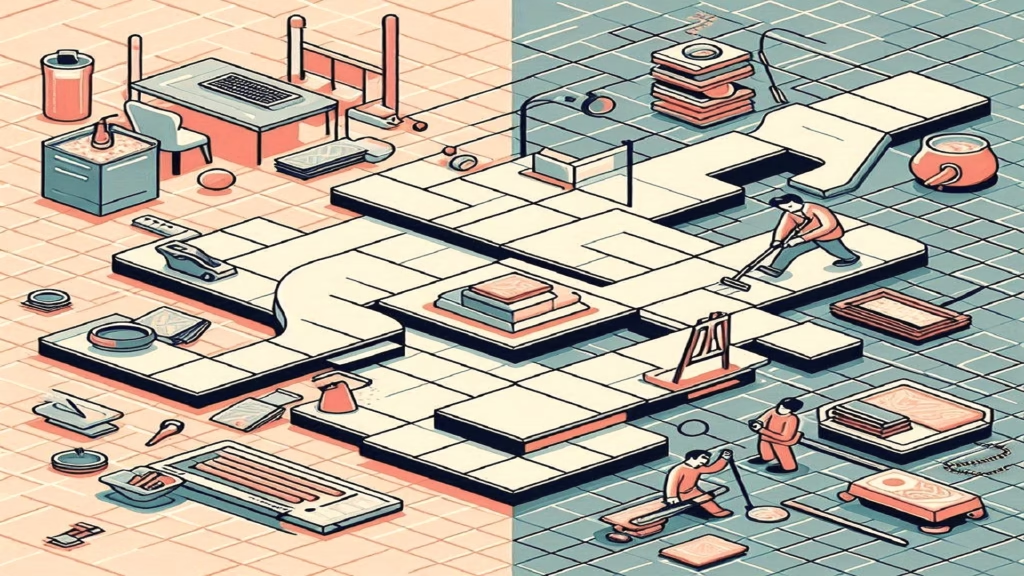
Porcelain Tiles for Commercial Use
Porcelain tiles aren’t just for homes—they’re also a popular choice for commercial spaces. Whether it’s for a retail store, office building, or restaurant, porcelain’s durability and versatility make it an excellent choice for businesses looking to invest in long-lasting, high-performance flooring.
Retail Spaces
For retail spaces, porcelain tiles offer an upscale look with the durability to handle heavy foot traffic. Whether it’s a boutique, department store, or gallery, porcelain tiles provide an aesthetic that aligns with the brand’s image while being easy to maintain.
Restaurants and Cafes
In restaurants, where spills and stains are common, porcelain tiles provide a practical, easy-to-clean solution that can also withstand grease and food stains. Textured porcelain tiles can also provide slip resistance in kitchens or outdoor dining areas.
Offices and Corporate Spaces
In offices, porcelain tiles offer a sleek and professional appearance. They can withstand the wear and tear of daily office life while providing a polished look to client-facing areas.
The Durability of Porcelain Tiles
Porcelain tiles are often considered one of the most durable flooring options available. The reason for this is their composition—made from denser materials than ceramic tiles, they are less prone to cracking, chipping, and staining. Here’s a deeper look into their durability:
- Scratch Resistance: Porcelain tiles are highly scratch-resistant, which makes them ideal for homes with pets or children.
- Wear Resistance: The wear layer of porcelain tiles ensures that they can withstand the test of time without showing signs of heavy use, even in high-traffic areas.
- Fading Resistance: Porcelain tiles maintain their vibrant colors and patterns without fading, even when exposed to sunlight over time.
- Shock Resistance: Unlike many other materials, porcelain tiles can handle impacts without breaking, making them a suitable choice for high-impact areas like kitchens and hallways.
Author Remarks
Porcelain tile is a highly durable, versatile, and aesthetically pleasing flooring option that can transform any space. Whether you’re looking for a modern, glossy finish or a rustic, wood-like look, porcelain tiles have something to offer. They are easy to maintain, water-resistant, and come in a wide variety of designs to suit every style.
So, if you’re looking to enhance your home with beautiful, long-lasting flooring, porcelain tiles are the way to go. With their unbeatable durability, aesthetic appeal, and sustainability, porcelain tiles are truly a flooring solution that stands the test of time.

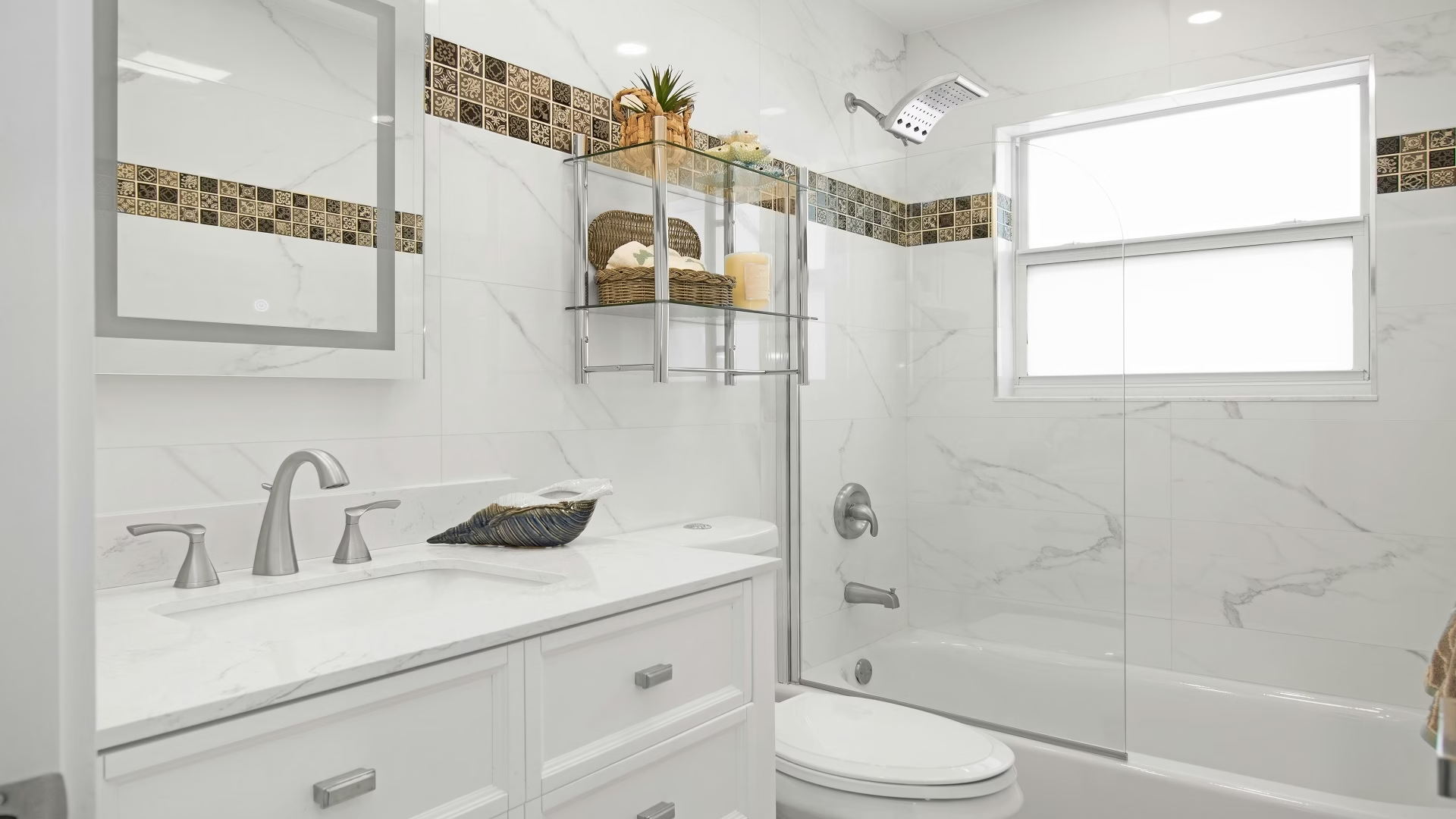
Чего нельзя делать при синдроме беспокойных ног, типичные обманы.
Секретные методы борьбы с синдромом беспокойных ног, какие приемы действенны?
чем лечить синдром беспокойных ног какие таблетки [url=https://bespokoynyye-nogi.ru/]чем лечить синдром беспокойных ног какие таблетки[/url] .
бетадин свечи побочные эффекты [url=https://svechi-dlya-zhenshchin.ru/]https://svechi-dlya-zhenshchin.ru/[/url] .
супрастин таблетки инструкция цена [url=https://www.xn--80aaihcqsam1bfkn2p.xn--p1ai]https://www.xn--80aaihcqsam1bfkn2p.xn--p1ai[/url] .